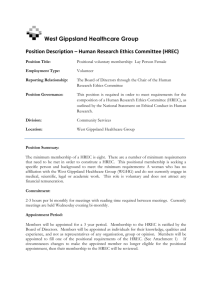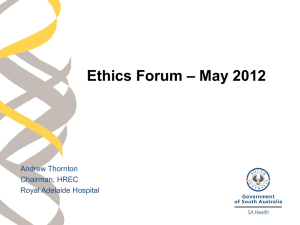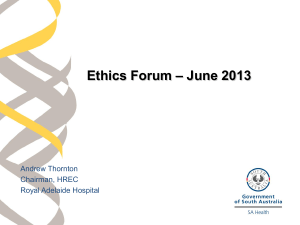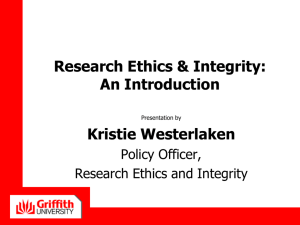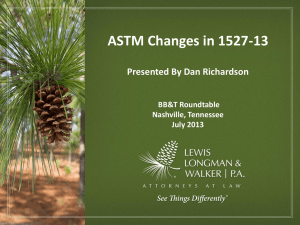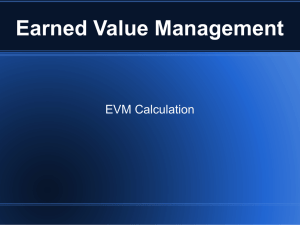RAH Presentation 25 Oct 2013
advertisement
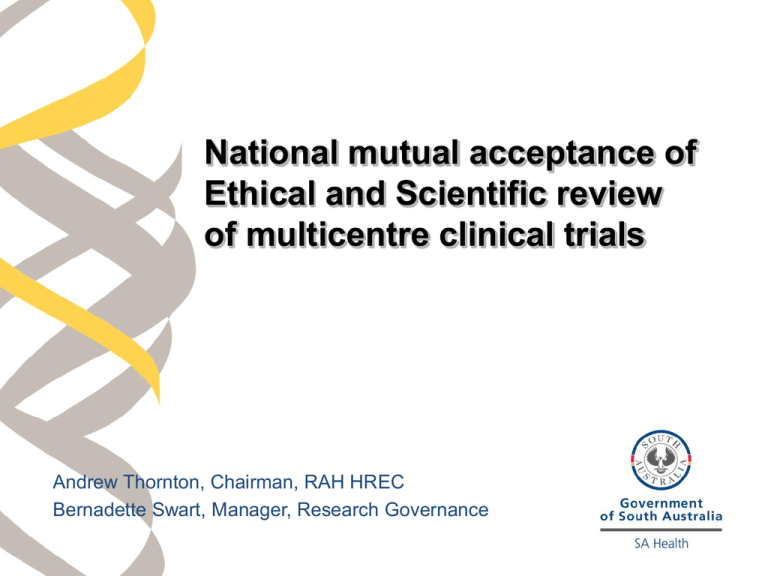
National mutual acceptance of Ethical and Scientific review of multicentre clinical trials Andrew Thornton, Chairman, RAH HREC Bernadette Swart, Manager, Research Governance The MOU The memorandum of understanding (MOU) for the national approach to ethical review of clinical trials has been signed and applies to public health organisations in the following jurisdictions as at 1 November 2013: • QLD • NSW • Victoria, and • SA There will not be retrospective acceptance of clinical trials in to national mutual acceptance. Working Documents The MOU sets out the arrangements between the Parties to achieve single ethical review of multi-centre Clinical Trials being conducted at their Public Health Organisations. • A list will be provided online The MOU applies only to the ethical and scientific review of multi-centre Clinical Trials. All other research will be ethically and scientifically reviewed as per individual jurisdictional processes. • With some exceptions Standard Principles for Operations - National Approach to Single Ethical and Scientific Review of Multi-centre Clinical Trials (Draft) Definitions What is a Multi-centre Clinical Trial? • Conduct of research at more than one organisation; • Research conducted jointly by investigators affiliated with different organisations. What is Mutual recognition • Acceptance of ethical and scientific review of a multi-centre Clinical Trial undertaken by one of the Certified HRECs on the proviso that the certified HREC is associated with the Public Health Organisation at which the clinical trial is occurring. • A list will be provided online Scope of Research Covered Interventional research involving a drug and/or a device, radiation therapy, surgery, treatment or diagnostic procedure and studies associated with ongoing activities relating to trials that have been conducted. This may include observational research and evaluation of a trial, developing a registry and other post-marketing surveillance activities. In South Australia this does not include: o Phase 0 (first time in human) and Phase 1 clinical trials Approval must be sought by a South Australian HREC o Studies involving SA Aboriginal and Torres Strait Islanders Approval must be sought by the Aboriginal Health Research Ethics Committee (AHREC), (Other state exceptions and conditions will be available online) Scope of Research Covered The National Approach includes the above research involving adults and/or children conducted by: o Commercial sponsors; o Collaborative groups/Consortiums, either supported (in part) or not supported by a commercial company; o Investigator initiated groups, either supported (in part) or not supported by a commercial company. Private health organisations may also accept the review of a NHMRC certified Reviewing HREC. However, some jurisdictions may have certain requirements to provide ethical approval for private health organisations. How to choose Reviewing HREC A Reviewing HREC is required to be a NHMRC certified HREC in Clinical Trials. The selection of the Reviewing HREC to undertake the single ethical and scientific review of a given multicentre Clinical Trial is either: • In Victoria - through a Central Allocation System for HRECs; • In QLD -through the Central Co-ordinating System for HRECs; • In NSW - at the discretion of the Applicant for HRECs; • In South Australia, to the Certified HREC associated with the site at which the Applicant is conducting the research and if this is not applicable, the selection of the Certified HREC is at the discretion of the Applicant; NEAF The National Ethics Application Form (NEAF) is to be used for an ethics submission to a Reviewing HREC and is submitted by the Coordinating Principal Investigator (CPI). The CPI must sign the declaration section of the NEAF. PIs are not required to sign as they will make a declaration in the SSA form The Reviewing HREC may request changes to the NEAF and a revised document must be submitted. Use of the NEAF does not eliminate the need for a research protocol or compliance with the local requirements of the reviewing HREC. Master participant information and consent form • The NHMRC templates are the recommended Master Participant Information and Consent Forms (PICF) • Other Master PICFs may be acceptable, providing they adhere to the conventions of the NHMRC templates. • A Master PICF is to be submitted on the letterhead of the Coordinating Principal Investigator’s (CPI) organisation. • Site Master PICF may be submitted by a participating site and must be based on the Master PICF with addition of specific site requirements or policies relating to the conduct of the research. The Site Master PICF should be on the letterhead of the site with an appropriate footer, referencing the Master PICF and version. Coordinating Principal Investigator (CPI) • is the individual who takes overall responsibility for the research project and submits the project for ethical review • responsible for ongoing communication with the reviewing HREC and passing on information from the HREC to the sponsor and the Principal Investigator (PI) and trial coordinator at each site conducting the research • is the PI at their own site and is therefore responsible for passing on information from the HREC to their own site’s Research Governance Office (RGO) • must sign the declaration section of the NEAF. PIs are not required to sign the declaration as they will make a declaration in the site specific assessment form. Principal Investigator (PI) • is the individual who takes responsibility at their own site for the conduct, management, monitoring and reporting of research via the Coordinating Principal Investigator (CPI) to the reviewing HREC • submits site specific assessment documents for site authorisation and liaises with the site Research Governance Office (RGO) throughout the life of the research project Ethics approval letters • Will list all organisations (or sites) that have been approved through single ethical review; • State the anniversary date on which all approved sites should submit an annual progress report to the Reviewing HREC and stipulate if reporting should be more frequent in accordance with the risk of the research; • List documents, with version identification, associated with the clinical trial that was reviewed and approved by the Reviewing HREC; and • Indicate that the research cannot commence until research governance/site specific assessment authorisation has been completed by the participating organisation/site. Duration of ethics approval • Ethical approval for interventional clinical trials will be for a five year period or rolling approval for the life of the study. • An exception to a five year period may occur in cases where a shorter time is requested for the research. • Extension of the ethical approval period may be requested. • In some jurisdictions a new ethics submission, review and ethical approval is required. The process to be followed will depend on the decision of the Reviewing HREC. Annual reports Ethical approval will be contingent upon receipt of an annual (or more frequent) report to the Reviewing HREC from the CPI. The due date is one year from the date of the Reviewing HREC approval date. In addition: • PIs must complete a HREC Progress Report for their Site in the format as specified by the Reviewing HREC • PIs will complete the final HREC report for their site • The PI will submit 1 copy of a report to the CPI and 1 copy to their site’s RGO • The CPI submits all reports to the Reviewing HREC AE, SAE and SUSARs • The PI will complete the appropriate Safety Report and submit to the CPI and the site RGO as soon as possible (within 24 hours where required) • If the CPI is not contactable in the urgent reporting timeframe, the PI may submit the Safety Report to the Reviewing HREC directly, and notify the CPI that they have done so. • The CPI will send a copy of the HREC review outcome to the sponsor, PI and trial coordinator at each site, and own site’s RGO • PI will send a copy to their RGO • The PI will send a copy of the RGO acknowledgement to the sponsor Amendments • Must be submitted by the CPI to the Reviewing HREC. • The CPI is responsible for notifying all site PIs of the amendment, in order for them to discuss it with their RGO. • An amendment must not be implemented at a site until the HREC amendment has been approved by the Reviewing HREC and (if applicable) Site Specific Assessment (SSA) amendment has been authorised at the site. • If an SSA / CTRA amendment is not required, the RGO will acknowledge receipt of the HREC amendment Monitoring guidelines Safety reporting is the responsibility of CPI and PIs and should be guided by the: “NHMRC Australian Health Ethics Committee (AHEC) Position Statement: Monitoring and reporting of safety for clinical trials involving therapeutic products”. The Monitoring and Reporting Tables for the National Approach should be referred to (see http://hrep.nhmrc.gov.au/_uploads/files/Framework_f or_Monitoring.pdf )
